how to keep goats without a fence
Finding shortcuts is natural for most people, especially homesteaders, but sometimes a shortcut can set you back both with time and money. This article on how to keep goats without a fence will help you decide if a shortcut with your livestock is one you want to try out.
A unique approach to goat fence ideas that does not require a permanent solution that might work for you.
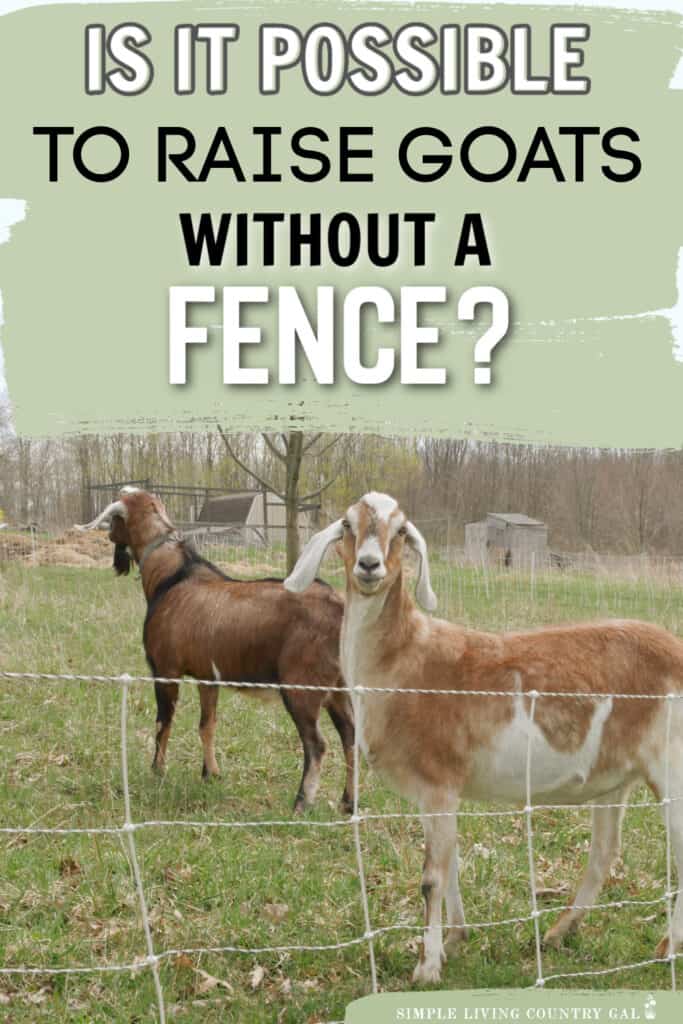
Are you looking for a way to raise some extra farm animals that can generate income and other amazing bonuses? Goats are an ideal option. Not only are they fun to raise they also can supply your family with milk that you can use to make butter, lotions, soap, or drink it as is.
Getting started with any animals can be overwhelming, and if you are a homesteader who doesn’t have the room or the money for a fence, does that mean goats are off the table? The answer is yes and no.
Keeping goats can be tricky if your property isn’t fenced in or has uneven terrain or slopes, making fence installation difficult. But before you give up on having these fun and beneficial animals, here’s something important for you to consider: It is possible to raise goats without fencing. We’ll walk through tips on what kind of housing setup works best, as well as which breeds do better outside fences and how to corral them so they stay close while grazing.
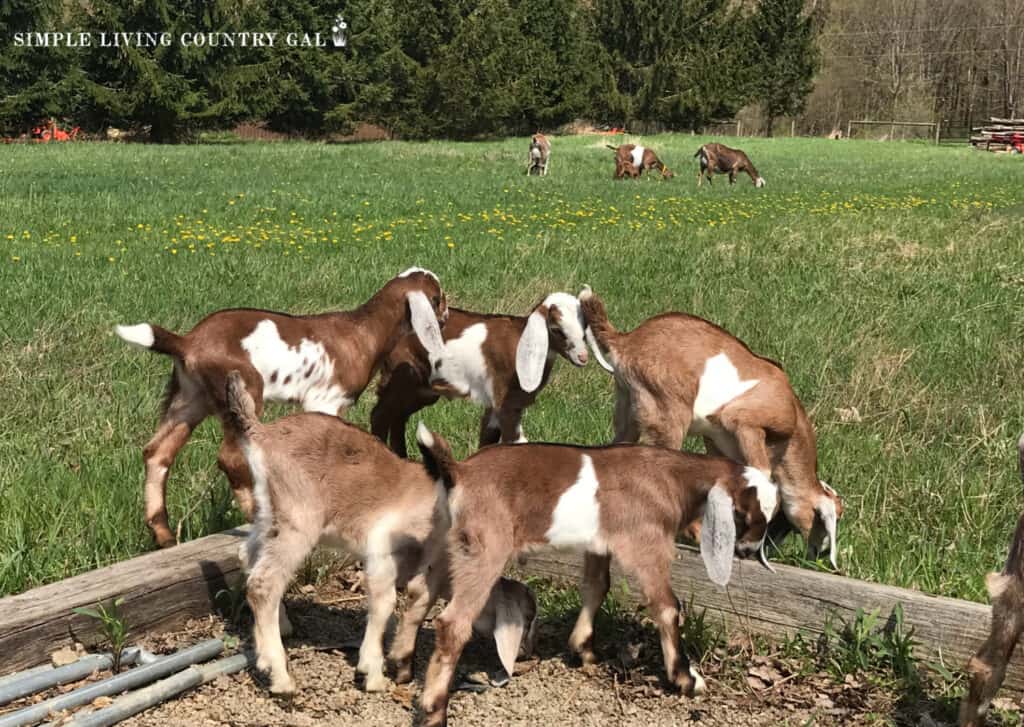
raising goats without a fence
Why would you want to raise goats without a fence? Well, there are a couple of reasons. Let’s go over them both first.
#1. If you live in a remote area with lots of land, then raising goats without a permanent fence installed may be an option to consider. Let’s face it: building a permanent fence can be expensive, especially if you have uneven or rocky terrain. By not having to invest in fencing materials and labor, you can save money that can be put toward other homesteading projects.
#2. Another reason may be if you live in an area that has no grazing at all, then you can most likely get away without a fenced-in grazing area. You will still need to have a space outside in the sunshine. Goats love to sit in the sun; by having a small area for them to do so, you will have happier goats.
Goats are natural foragers and can thrive on a variety of plants. Without fencing, they have the freedom to roam and graze on different types of vegetation, which can improve their diet and health. Just know they are not aware of boundary lines and will easily go onto other people’s property to graze, which can cause you a few headaches if they do.
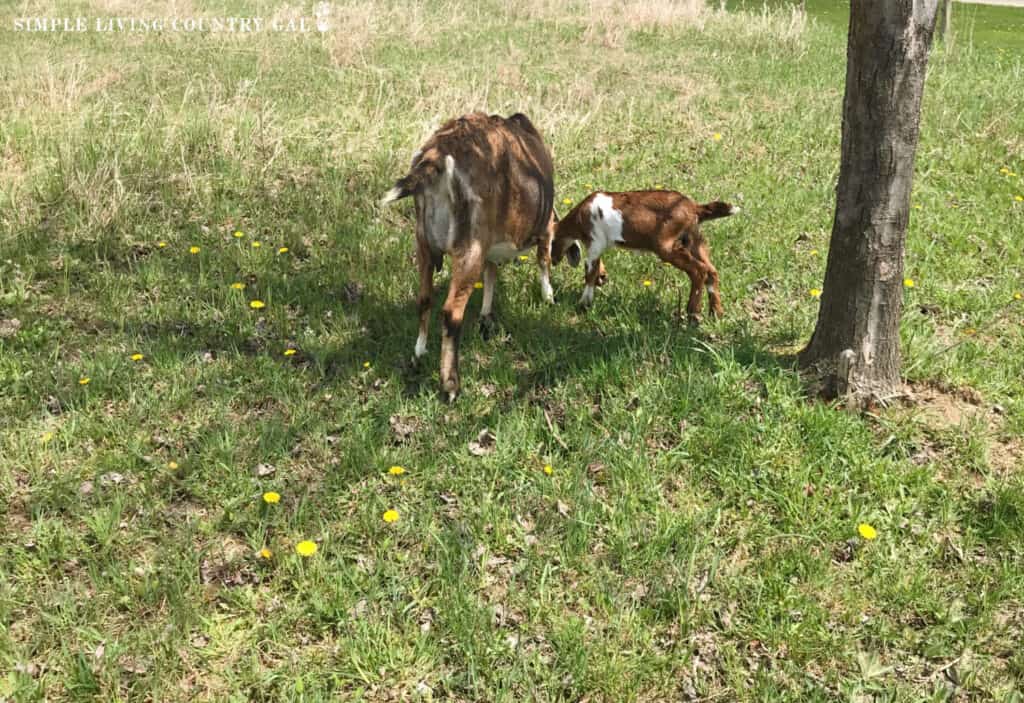
When is it not okay to raise goats without a fence?
Personally, I am not a fan of raising goats without a fence mainly because of the risk of predators and how close our neighbors are to our home. If you also live in an area that has neighbors close by, I would not recommend free-ranging your goats without at least some sort of perimeter set up to contain them.
It is important to remember that if you intentionally allow any animals to run at large, there is a high likelihood. You will be liable for any damages associated with that animal. That means if your goats damage a neighbor’s garden, damage their car by climbing on it, or cause an automobile accident, you may find yourself in an uncomfortable and expensive predicament or even a legal one.
Tips for keeping goats without a fence
If you’re still interested in raising goats without a fence here are some practical tips to help ensure they at least stay close by and return to their shelter each evening. Just know that these suggestions are not fool-proof and not fencing in your animals does come with a risk.
Provide proper shelter:
Goats need shelter from harsh weather conditions such as rain, wind, and extreme temperatures. Make sure to provide a sturdy shelter for your goats to seek refuge in, such as a shed, lean-to, or a barn. Goats will return to their main shelter many times throughout the day so it is good to be sure to have fresh water waiting for them and an area for them to get out of the hot sun or the cold rain.
Use electric netting
This is a great option for permanent fencing and can go a long way to free-ranging your herd while still keeping them on your property. Electric fence netting is easy to install and maintain, and you can move it around to different areas, allowing your goats to free range while still providing them with protection.
We love electric fence netting and find it extremely useful with our herd in a variety of situations.
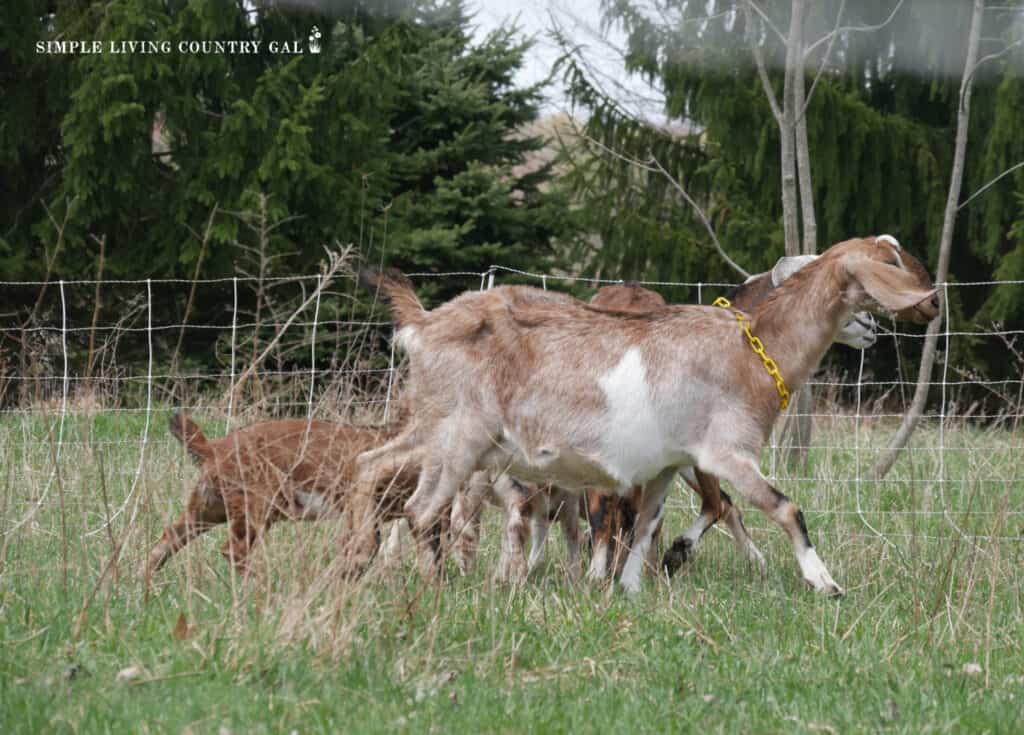
Train your goats:
Spend time training your goats to come when called and stay close to you. This will help them understand boundaries and minimize the risk of them wandering off too far. Goats are very food-motivated, and you can use that to help train them to come, stay, or return to the barn with a call.
Read: How to Train Diary Goats
Utilize natural barriers:
You can use natural barriers such as hedges, trees, and rocks to create a boundary for your goats. These barriers can also provide shade and shelter for your herd throughout the day.
Be vigilant:
Keeping goats without a fence requires constant monitoring and supervision. Regularly check on your goats and make sure they are not straying too far or getting into trouble. Raising any animals comes with a great deal of responsibility, be sure to do your best to keep them safe and you will enjoy the benefits of this amazing animal.
Get a livestock guardian dog:
These dogs are trained to protect and herd livestock, making them a valuable asset for homesteaders without fences. They can also help keep predators away from your goats, allowing them to graze with protection. Training guardian dogs does take time but if they are well trained they will be come a valuable asset to your entire homestead.
What are good guardian dogs for goats:
- Great Pyrenees
- Anatolian Shepherd
- Komondor
- Akbash
- Maremma
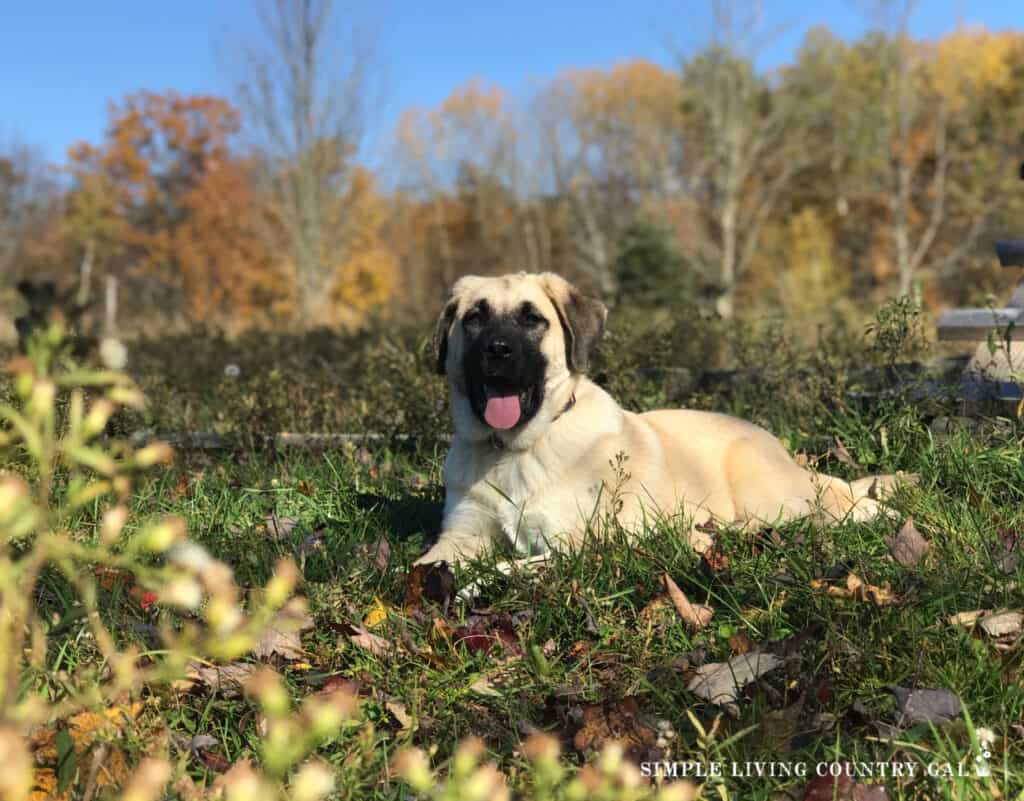
Create a routine:
Establishing a daily routine with specific feeding times and activities can help keep your goats close to their designated area. Goats thrive on routines and they will return to the barn when they know food will be offered. This is a great tool to have if you are allowing your herd to free-range your property.
Provide adequate food and water:
Make sure your goats have access to fresh, clean water and plenty of food, such as good quality hay as well as free choice minerals. A well-fed goat is less likely to wander off in search of better options and will return home routinely throughout the day.
Keep them entertained:
Goats are curious animals and can get bored easily. Providing them with things to climb on or other toys, such as a hanging tire or a ball will keep them from wandering off. A few tires and wood platforms are all you need to setup a playground for your herd.
READ:
Dairy Goat Supplies:
Estink Manual Goat Milking Kit, 3L Plastic Portable Household Goat Milking Machine Manual Operation Sheep Cow Milker Kit Hand Pump Milker Machine for Farm Household Cow Goat Milking (for Sheep)




![WIDE Mouth Mason Jar Lids [16 Pack] for Ball, Kerr and More - White Plastic Storage Caps for Mason/Canning Jars - Leak-Proof](https://easyproductdisplays.com/wp-content/uploads/2017/07/buy6.gif)
What goat breeds are best for free-ranging?
There are several breeds of goats that are better suited for free-ranging than others. The most common ones include:
Boer Goats:
These goats were originally bred for meat production and have a docile nature, making them less likely to stray.
Kiko Goats:
As hardy and adaptable animals, Kiko goats can thrive in various environments without the need for a fence.
Spanish Goats:
With a natural inclination to forage and graze, Spanish goats are well-suited for free-ranging. They are also known for their hardiness and resistance to diseases.
Pygmy Goats:
These small-sized goats are easy to handle and have a friendly disposition, making them ideal for homesteaders without fences.
Nigerian Dwarf Goats:
These goats are known for their small size, making them easy to manage and less likely to cause damage if they do stray. They are also great milk producers, which can be a valuable asset for homesteaders.
Fainting Goats:
Although their name may suggest otherwise, fainting goats have a calm nature and tend to stay close to their herd, making them suitable for free-roaming.
While fencing is the most common method of keeping goats contained, there are alternative methods for those who do not have access to suitable fencing or prefer a more natural approach. By implementing these tips and techniques, you can train your goats to stay within designated areas without permanent fencing.
However, it is important to note that constant monitoring and supervision are still necessary to ensure the safety and well-being of your goats. Explore these alternative methods and see if they are a good option for you.
More Goat Care Resources:
- How to Prepare for Goats
- Daily Goat Care Routine
- Goat Terms for Raising Dairy Goats


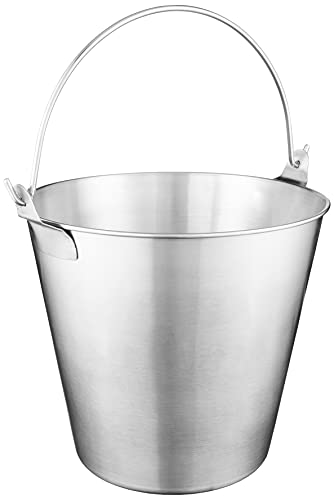
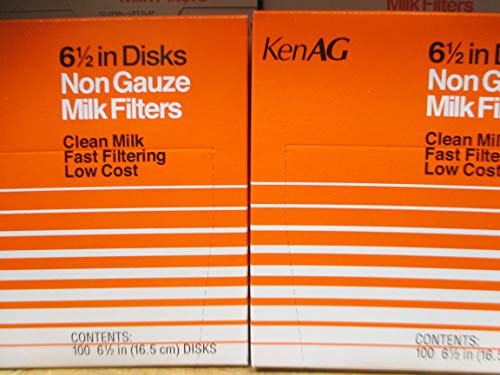


![WIDE Mouth Mason Jar Lids [16 Pack] for Ball, Kerr and More - White Plastic Storage Caps for Mason/Canning Jars - Leak-Proof](https://m.media-amazon.com/images/I/315hC2lw8+L._SL500_.jpg)
